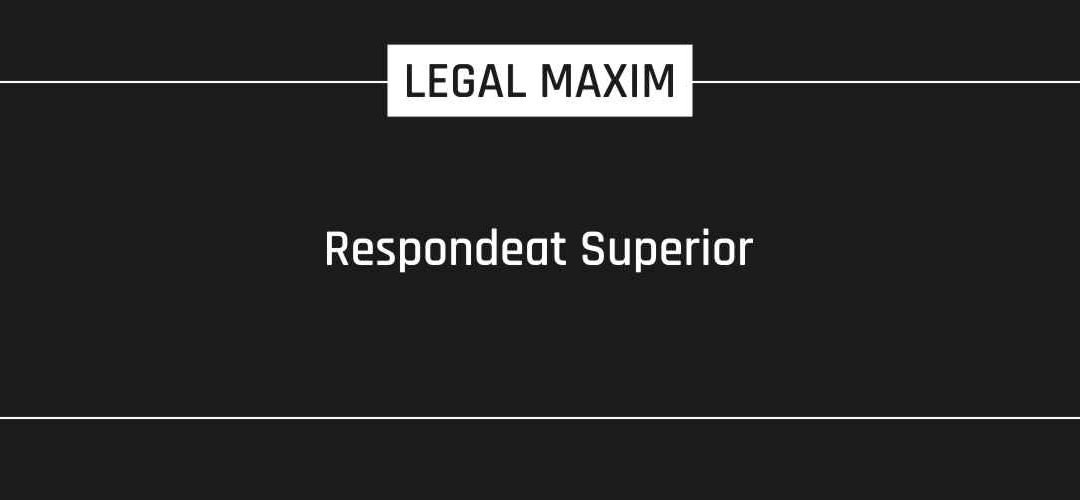Literal Meaning
Let the Master Answer
Origin
Latin
Explanation
The above legal doctrine holds an employer or the principal legally responsible/ liable for the wrongful acts of an employee or agent when it occurs within the scope of the employment or agency. It is based on the concept of ‘vicarious liability.’ An employer is ought to be liable for the negligent acts of his/her employee, committed within the scope of their employment. In order to impose such liability, evidence showing a master-servant relationship between both parties existed is mandatory. The doctrine’s scope is limited to the employment relationship and to conduct falling within the scope of that relationship.
No right = No liability
Thus, the doctrine provides that an employer is subject to liability for torts committed by employees while acting within the scope of their employment. Acts that are done by the subordinates by their employment and agency can be with the express or implied authority of an employer and a master respectively. In general, Vicarious liability is a form of indirect liability that is imposed when parties have a particular relationship i.e. employer-employee. Accordingly, a principal is required to answer for an agent’s negligent or otherwise wrongful actions, in the cases applicable.`
There are two requirements of the doctrine
- A true master-servant or an employer-employee relationship.
- The tortious act of a servant or an employee must be one within the scope of his employment
Illustration
‘A’ is employed as a security guard at a shopping mall whose job was to create a presence to reduce theft. ‘B’ one of the customers starts an argument with A and is ushered out the door by ‘C’ another security guard. Furious with the argument, A, follows the man out into the parking lot and punches him. Later ‘B’ files a lawsuit against ‘D’ (the owner of the shopping mall). In this case, it is relevant to mention that asking the man to leave the shop when he caused a problem is within the scope of A’s employment. However, losing his temper, chasing the man outside, then physically assaulting him is not. Thus, in this case, the doctrine of respondeat superior would not apply, as justice would not be served to hold the employer responsible for A’s illegal act.
Case Law
The Rajasthan High Court in Automobiles Transport vs. Dewalal and ors, held that the employer (Automobiles transport company) is liable for the acts of the servant during the course of their employment. The argument of the appellant that the driver was not directed to go through a particular way did not evince interest in their lordship because it is farcical at its best as one can’t expect. For example, the driver was to wait in case of a blockade of a particular direction and not move in the other direction to carry out its work although, in case the road is clear, there may be a different picture altogether. Failure to prove such a requirement would condemn the appellant for liability under both the principle of vicarious liability and the doctrine of Respondeat Superior.
In Ram Ghulam v. U. P. Government, the Allahabad High Court held that stolen property was seized under the provisions of the Criminal Procedure Code and was lost on account of the negligence of the Government servants. It was held that in such cases, the Government did not occupy the position of a bailee in respect of the property and was not liable to indemnify the owners in Case of their loss due to the negligence of its servants. It was also held that the rule embodied in the maxim ‘respondeat superior’ is subject to the exception that the master is not liable for the acts of his servants performed in the discharge of a duty imposed by law.
In Biranchi Narayan Sahu vs Unknown, the facts of the case are that the petitioner was the father of a female student, who was murdered by a teacher in a Government School during school hours within the school premises. Autopsy of the deceased revealed that she was raped and murdered. A school teacher by name Santha Charan Pattnaik was convicted in the case and sentenced him to undergo rigorous life imprisonment. The Orissa High Court held that ‘Needless to say school is a temple of learning. It is the prime duty of the State to appoint persons of high moral character as teachers in the Schools. The State is also liable to protect the life of the children studying in schools and ensure their education with dignity. Since the heinous, barbaric and inhuman act has been committed by the teacher of a government school, it would be appropriate to hold that this case is governed by the legal maxim “respondeat superior” and thus the State is liable for a wrong done by its teacher.

Good and simple liked the way its explained.